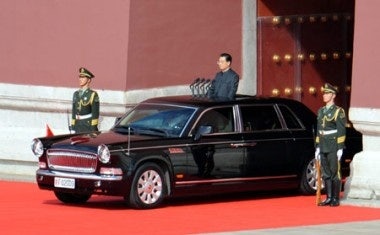Domestic Automakers Like FAW Stand To Gain From Expected Shift#

If a recently announced plan by Beijing to require government offices to purchase only domestic auto brands holds water, the ubiquitous black Audi sedans so beloved by mid-level bureaucrats throughout China may be replaced by the models by home-grown automakers like FAW. As Reuters notes this week, after the upcoming leadership change -- which should see the country's current leader-in-waiting Xi Jinping emerge from a Red Flag limousine, not unlike the one that ferried Hu Jintao through Beijing in 2009, rather than a Cadillac, BMW or Buick. Via Reuters:
The move, announced over the weekend, is not final and would likely have a limited effect on foreign automakers in China, since government fleet sales account for less than 10 percent of car sales, according to some estimates.
But the policy is good news to Ling Liang, a sales manager at an FAW dealership in Beijing, where only two cars sat in a dimly lit showroom, with no customers.
"We have long tradition and experience, more than other Chinese brands," Ling said of FAW Group, whose brands include Besturn mid-range sedans and the former Red Flag.
As China Car Times details, the official list of approved models sheds a little more light on Beijing's thinking, both in terms of cost and fuel-efficiency, as the majority of vehicles are limited to 1.5L or 1.6L engines, with the larger sedans coming in at a modest 1.8L:
According to the list issued by the Ministry of Information and Technology the government has authorized 412 different models for Chinese party cadres to buy with government money, every year the government spends some 80 billion RMB on bringing new cars into the government fleet, for the longest periods of time these cars were of course foreign and Chinese cars but going forward they will all be Chinese cars from Chinese brands.
Four pure electric cars have made it into the final list of 412 vehicles, 78 SUV’s have entered as well as 64 ‘multi purpose vehicles’ (likely pick up trucks), 265 gasoline and diesel sedans have been entered as well. On the branding front it, Hong Qi, Xia Li, Dongfeng’s Fengshen sedan range as well as Feng Xing MPV range, Chang-an’s mini van range, Guangzhou Auto’s Trumpchi, and SAIC’s MG and Roewe vehicles have all become official government vehicles for this year. Lifan, BYD, Chery, Geely, Great Wall, Brilliance and Zotye have all won places in the list.
Rather than being an endorsement of the quality of domestically made vehicles, the moves seem to many to be a fairly obvious attempt to assuage public frustration at the often extravagant behavior of government officials. Nonetheless, if the proposed plan actually is enacted and the likes of Audi and BMW see their government sales drop off -- a drop that, admittedly, would have a limited impact on nationwide sales -- one of the home-grown companies that stands to gain is the state-owned FAW (First Automotive Works) Group, one of China's "top 4" automakers, along with Chang'an Motors, Dongfeng Motor, and the Shanghai Automotive Industry Corporation (SAIC). Founded in 1953, FAW's comparatively luxurious Red Flag (Hong Qi) sedan started rolling off the assembly line in 1958 and, for the next 20 years, was the preferred mode of transportation for the Beijing political elite. Following the economic reforms of the late 1970s and throughout the 1980s, interest in Red Flag gradually waned among both Party elites and the country's new generation of entrepreneurs.
Now producing a massive array of brands in addition to Red Flag, including Besturn, Haima and Dario, and producing (with joint-venture partners) Audi, GM and Mazda, FAW's large footprint puts it in a good position to capture more bureaucrat business in the years ahead. Still, the fact remains that the capacity of domestic automakers to make original high-end vehicles that truly rival BMW, Mercedes-Benz or Audi -- and the ability of savvy officials to evade the official rules -- will probably mean the recent announcement will have little real impact. As the Wall Street Journal concludes:
[T]hough Chinese companies like Chery and BYD are bumper-to-bumper in the budget end of the market, they don't have the technology or the brand image to make a dent on the luxury end. With limited domestic competition, Audi's China sales rose 29.2% year-to-year in the first three quarters of 2011, considerably outpacing growth in sales for the auto market as a whole.
The new list is good public relations for a government keen to show it is cracking down on abuse of public funds. But it will be a while before China's citizens can hope to spy officials behind the black tinted windows of a domestic brand car.
